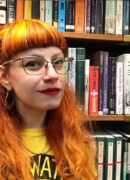Course Information
| Session |
|---|
| Credits | 1.5 CEUs or 15 PDHs |
|---|---|
| Registration dates | We accept registrations through the first week of classes, unless enrollment is full, and unless the class was canceled before it started due to low enrollment. |
$250.00
Credits: 1.5 CEUs or 15 PDHs
In this unique course designed for library leaders with an appetite for change and social justice, Emma Karin Eriksson, Meredith Farkas, and Chelsea Jordan-Makely will unpack the potential uses of theory in undoing the harmful aspects of library culture that stand as obstacles to transformative change. To do so, we’ll examine the roots of librarianship in scientific management and capitalism, and then look to ideas that will be useful in undoing the outdated social constructs that shape library work and cause harm to the communities we purport to serve. Our goal is to give participants a more complete view of the big picture and tools to lead their organizations toward transparent, collaborative, and values-driven practices, and to bring forth radical change in librarianship and our respective communities. By the end of the course, participants will be better able to identify and describe bureaucracy in their organizations and be able to apply critical theory and slow librarianship to dismantle, reform, or propose alternatives to these structures. Moreover, participants will have gained more perspective and tools to continue their praxis in their work environments and personal lives. By the end of the course:
| Session |
|---|
| Credits | 1.5 CEUs or 15 PDHs |
|---|---|
| Registration dates | We accept registrations through the first week of classes, unless enrollment is full, and unless the class was canceled before it started due to low enrollment. |
In this unique course designed for library leaders with an appetite for change and social justice, Emma Karin Eriksson, Meredith Farkas, and Chelsea Jordan-Makely will unpack the potential uses of theory in undoing the harmful aspects of library culture that stand as obstacles to transformative change. To do so, we’ll examine the roots of librarianship in scientific management and capitalism, and then look to ideas that will be useful in undoing the outdated social constructs that shape library work and cause harm to the communities we purport to serve. Our goal is to give participants a more complete view of the big picture and tools to lead their organizations toward transparent, collaborative, and values-driven practices, and to bring forth radical change in librarianship and our respective communities. By the end of the course, participants will be better able to identify and describe bureaucracy in their organizations and be able to apply critical theory and slow librarianship to dismantle, reform, or propose alternatives to these structures. Moreover, participants will have gained more perspective and tools to continue their praxis in their work environments and personal lives. By the end of the course:
 Chelsea Jordan-Makely is a library director in a small, rural community in western Massachusetts, and a vocal practitioner of critical librarianship. She has worked in public, academic, state, and special libraries in four countries, and has served on the PLA's Digital Literacy Committee since 2016. She is also a Co-Lead for the American Library Association’s Library Services to the Justice Involved (LSJI) interest group. Chelsea's study of libraries as bureaucracies challenges dominant notions about bureaucracy, as well as the status quo of libraries as impersonal, undertheorized workspaces. Chelsea balances librarianship with leisure reading, riding bikes, gardening, and quality time with friends and family.
Chelsea Jordan-Makely is a library director in a small, rural community in western Massachusetts, and a vocal practitioner of critical librarianship. She has worked in public, academic, state, and special libraries in four countries, and has served on the PLA's Digital Literacy Committee since 2016. She is also a Co-Lead for the American Library Association’s Library Services to the Justice Involved (LSJI) interest group. Chelsea's study of libraries as bureaucracies challenges dominant notions about bureaucracy, as well as the status quo of libraries as impersonal, undertheorized workspaces. Chelsea balances librarianship with leisure reading, riding bikes, gardening, and quality time with friends and family.
 Emma Karin Eriksson (she/her) is an activist-academic whose personal and professional life is driven by a commitment to social justice. Believing deeply in people over property and profit Emma sees libraries as a place of liberation. She is a Senior Young Adult Librarian for the Brooklyn Public Library, a radical facilitator, and zine maker. To learn more about her, her work, or to get in contact visit www.bit.ly/emmakarin.
Emma Karin Eriksson (she/her) is an activist-academic whose personal and professional life is driven by a commitment to social justice. Believing deeply in people over property and profit Emma sees libraries as a place of liberation. She is a Senior Young Adult Librarian for the Brooklyn Public Library, a radical facilitator, and zine maker. To learn more about her, her work, or to get in contact visit www.bit.ly/emmakarin.
 Meredith Farkas (she/her) is a faculty librarian at Portland Community College in Oregon, a perpetual beginner, and a recovering workaholic. From 2007-2021, she wrote the “In Practice” column for American Libraries, focusing on accessible technologies, collaboration, values-driven work, antiracism, and reflective practice. She has also authored the blog Information Wants to be Free since 2004. Meredith was honored in 2009 with the LITA/Library Hi Tech award for Outstanding Communication in Library and Information Technology, and in 2014 with the ACRL Instruction Section Innovation Award. She's been in many different leadership and management roles in her career, but her favorite role is working with students and faculty as an instruction librarian.
Meredith Farkas (she/her) is a faculty librarian at Portland Community College in Oregon, a perpetual beginner, and a recovering workaholic. From 2007-2021, she wrote the “In Practice” column for American Libraries, focusing on accessible technologies, collaboration, values-driven work, antiracism, and reflective practice. She has also authored the blog Information Wants to be Free since 2004. Meredith was honored in 2009 with the LITA/Library Hi Tech award for Outstanding Communication in Library and Information Technology, and in 2014 with the ACRL Instruction Section Innovation Award. She's been in many different leadership and management roles in her career, but her favorite role is working with students and faculty as an instruction librarian.
Reviews
There are no reviews yet.